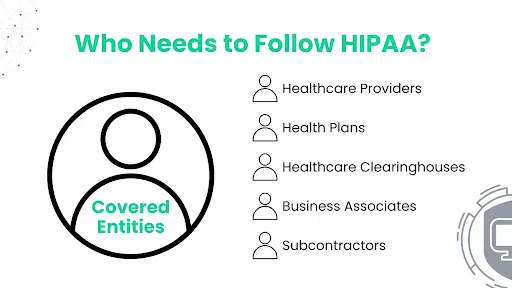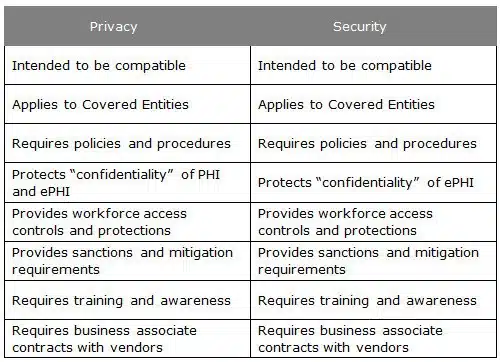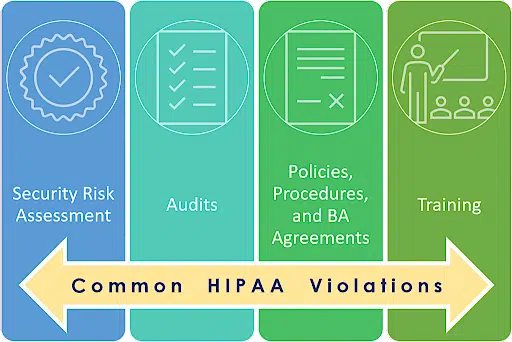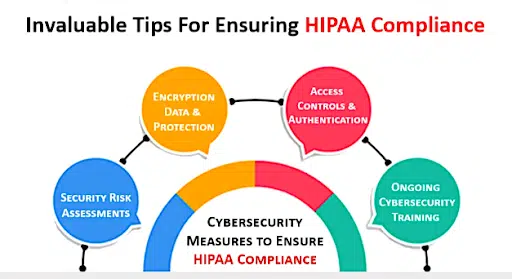Healthcare organizations and contractors in the United States face challenges beyond caring for the sick and wounded—they also have to protect their patients’ data. Protected health information (PHI) must be safeguarded from breaches and unauthorized access under the Health Insurance Portability and Accountability Act (HIPAA). However, healthcare data breaches have become a growing global epidemic.
The numbers over the past three years tell a terrifying tale. In 2021, 45.9 million healthcare records were breached, which grew to 51.9 million in 2022. Then, in 2023, an exponential escalation occurred as 133 million records were stolen, exposed, or improperly disclosed. Compliance with HIPAA and the HIPAA requirements for security awareness training are the primary ways organizations can fight against this torrent of cybercrimes.
HIPAA training equips healthcare workers with the knowledge and skills to protect PHI, covering essential topics such as understanding patient privacy rights, recognizing potential cybersecurity threats, and implementing effective data protection practices. Since human error is one of the leading causes of cyber attacks, training healthcare personnel to be aware of potential cybersecurity issues creates a robust organizational defense that reduces data breaches and other PHI leaks.
Who is HIPAA training for?
HIPAA training is required for employees within covered entities—such as healthcare providers, insurance companies, and healthcare clearinghouses—and their business associates who handle PHI. These organizations and their partners must ensure their staff are well-versed in the regulations to protect patient health information.
It’s recommended to renew HIPAA training certifications annually to keep up with changes in regulations and maintain a high standard of patient data protection. Annual training is an industry best practice for staying informed on healthcare privacy and security landscape updates and demonstrates an ongoing commitment to HIPAA compliance and patient confidentiality.

HIPAA Training Requirements: What are they, and why are they important?
HIPAA training requirements are guidelines found in the Health Insurance Portability and Accountability Act that confirm the staff of covered entities and their business associates are trained on properly handling Protected Health Information (PHI).
The requirements mandate that training should primarily cover two rules:
- The HIPAA Privacy Rule (45 CFR §164.530) deals with the rights of individuals to their health information and the conditions under which their data can be used or disclosed. Only covered entities must train staff in PHI policies and procedures and PHI breach reporting, although it’s a good idea for everyone. This training is mandatory for new hires, or if any significant modifications to an organization’s policies or processes exist.
- The HIPAA Security Rule (45 CFR §164.308) training focuses on the safeguards that must be in place to ensure the availability, integrity, and confidentiality of electronic PHI. It requires implementing a security awareness training program for all employees of covered entities and their business associates, with updated training periodically.
Training also must cover other related topics around rules and issues related to data breaches, HIPAA compliance, business operations, and security.
The HIPAA training requirements are critical for maintaining patient data’s privacy and security, preventing data breaches, and ensuring compliance with federal regulations. Additionally, this training helps ensure that employees from covered entities and their business partners are fully aware of their legal duties.

What are the benefits of HIPAA training?
HIPAA training brings healthcare organizations several important benefits, including:
Bolstering Organizational Cybersecurity
Training boosts the organization’s overall security posture by equipping staff with the know-how to recognize and respond to cyber threats effectively, further protecting PHI against potential cyber attacks.
Building Goodwill
It demonstrates a serious commitment to PHI protection, helping foster positive relationships with patients, clients, and other stakeholders—thereby enhancing the covered entity or associate’s reputation.
Ensuring Compliance
HIPAA training ensures that healthcare staff are aware of their legal responsibilities, reducing the risk of PHI breaches and compliance violations that could lead to significant penalties.
Increased Efficiency
By clarifying compliance processes, HIPAA training enhances the overall efficiency of healthcare operations and service delivery.
Legal Defense
It provides a foundation for legal defense in the event of HIPAA-related complaints, investigations, or lawsuits.
Managing Risks
Training helps identify and mitigate potential threats to PHI, making it easier to address security vulnerabilities effectively.
Protecting Privacy
HIPAA training emphasizes the importance of PHI’s confidentiality, integrity, and availability, which is essential for safeguarding patient privacy and trust.
What happens if you don’t comply with HIPAA training requirements?
Failing to comply with HIPAA training requirements can have serious consequences for healthcare organizations. Non-compliance risks include hefty fines and penalties from regulatory bodies, increased likelihood of data breaches due to untrained staff, potential legal actions, and a damaged reputation that can erode patient trust.
Moreover, it can result in operational disruptions and significant financial losses associated with breach remediation efforts. Ensuring all personnel are properly trained is crucial for safeguarding patient information and maintaining an organization’s operational integrity.

4 Essential HIPAA Training Requirements
Here’s a breakdown of the essential HIPAA training requirements and what’s involved with each:
1. Privacy Rule Training
PHI Identification
Protected Health Information (PHI) is individually identifiable health information maintained or transmitted in any form or medium (paper, electronic, oral) by a covered entity or its business associates, excluding certain educational and employment records.
Employees must understand what constitutes PHI as defined by HIPAA, including direct and indirect identifiers. Training should include real-world examples and emphasize recognizing non-protected information like de-identified data.
Minimum Necessary Rule
Training should focus on using only the minimum amount of PHI necessary for permitted purposes, include practical application scenarios, and document PHI access/use for each purpose.
Permitted Disclosures and Patient Rights
HIPAA training must educate employees on the twelve permitted uses and disclosures (treatment, payment, etc.) and emphasize that authorization is usually required for other uses. It also covers patients’ rights to access, amend, and request an accounting of disclosures with details on responding to these requests.
Confidentiality
Training should stress the importance of maintaining strict confidentiality of PHI, including internal security measures, access controls, and employee responsibilities regarding appropriate PHI handling.
2. Security Rule Training
Policies and Procedures
Staff should be trained on the organizational policies and procedures that have been put in place to comply with HIPAA security regulations.
Identifying Cybersecurity Threats
Through the required cybersecurity awareness program, employees must learn to recognize and protect against various security threats, such as hacking, phishing, and social engineering.
Safeguards and Risk Assessment
Trained staff must understand the three types of security safeguards (administrative, physical, technical) and the importance of regular risk assessments to identify vulnerabilities and implement appropriate mitigation measures.
They should also be trained on the security measures to protect PHI, such as firewalls, encryption, and secure remote access—and know how to use and maintain these measures properly.
Access Control and Password Management
Training should cover access control, granting access based on the principle of least privilege, and revoking access when necessary. Creating strong passwords and following secure password practices should be emphasized.

Incident Response
Healthcare staff requires education on detecting, investigating, and reporting breaches of unsecured PHI based on the Breach Notification Rule, including internal procedures and timely notification requirements.
Regular HIPAA Security Training
With the technology and threat landscape constantly changing, employees must regularly update their knowledge and skills per HIPAA security regulations.
3. Additional Requirements
Business Associate Agreements
Covered entities must ensure employees understand the requirements for Business Associate Agreements (BAAs) and the obligations of business associates who handle PHI on their behalf.
While the Security Rule applies directly to covered entities, business associates handling PHI must also provide HIPAA training to their workforce. Covered entities should ensure their business associates have appropriate training programs in place through their BAAs.
Consequences of Non-compliance
Training should inform employees of the potential civil and criminal penalties for violating HIPAA regulations and the damaging consequences of non-compliance.
Training Frequency and Documentation
HIPAA doesn’t mandate specific training frequency, but it states that training must be provided within a reasonable time for new employees and when there are material changes to policies or procedures. Consider annual refresher training to ensure up-to-date HIPAA knowledge and retention.
Documenting training completion for each employee is crucial for demonstrating compliance during potential audits or investigations.
4. Best Practices and Tips
Finally, here are some essential best practices and tips for effective HIPAA Training:
- The HIPAA training requirements are flexible and scalable, recognizing the diverse nature of covered entities. Tailor training content and depth to your organization’s specific roles, responsibilities, and risk levels.
- Conduct periodic training needs assessments to identify knowledge gaps or areas requiring additional focus in future training sessions.
- Encourage employees to stay informed about evolving HIPAA regulations and best practices through resources like the HHS website, industry publications, or professional development opportunities.
- Provide accessible resources and support for employees to ask questions, report concerns, or seek clarification on HIPAA-related matters.
- Interactive and engaging training methods, like those used by CybeReady’sCybeReady’s platform, enhance information retention.
- Consult with legal or healthcare compliance professionals for comprehensive guidance on developing and implementing your HIPAA training program.
HIPAA Training Requirements: Where Security Meets Privacy
Meeting HIPAA training requirements is critical for healthcare organizations to maintain HIPAA compliance and ensure patient data privacy and security. In a world where data breaches are an unfortunate regular event, HIPAA training provides healthcare staff with the skills and knowledge to keep PHI safe and reduce cybersecurity incidents.
CybeReady offers organizations proven security awareness training with an autonomous, fully-managed platform with engaging training that adapts to each employee’s performance. It helps build a security awareness culture and a robust human firewall around your business.
Contact CybeReady to learn how we can help your staff meet HIPAA security training requirements.













